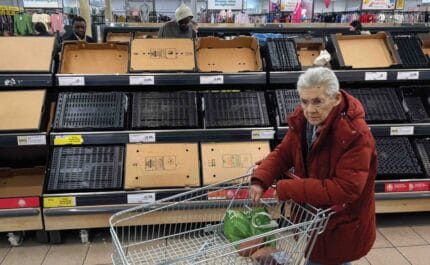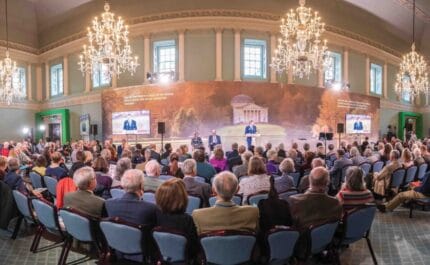And the winner is…
Can a Sudanese version of ‘The Apprentice’ TV show help the country’s economy get back on its feet? Susan Schulman met the first season’s winner to find out
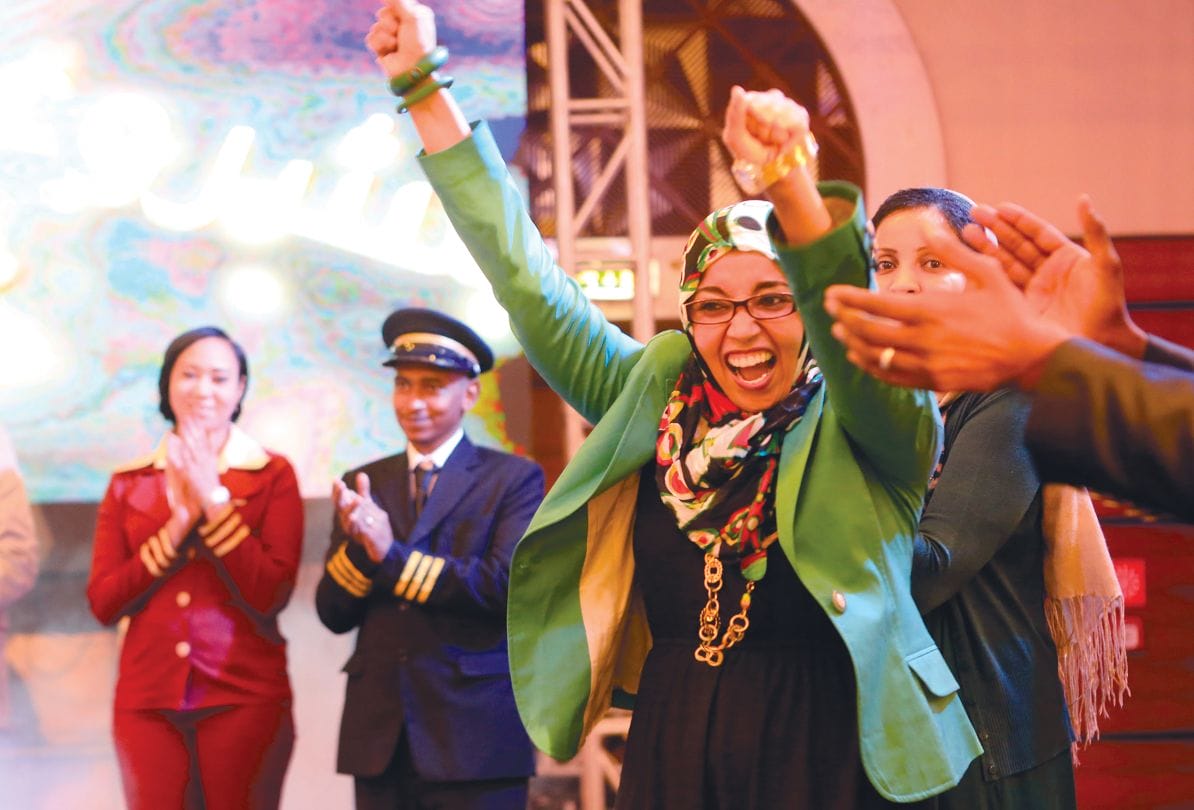
Photo: British Council
30th January 2014 (Taken from: #14)
The Corinthia hotel, Khartoum,
30th January 2014
Sudan’s answer to Alan Sugar has a dodgy microphone. He has successfully announced two runners-up, but when the moment comes to declare the winner of TV programme ‘Mashrouy’ (‘My project’) – the country’s version of ‘The Apprentice’ – the sound cuts out. The audience is left in momentary suspense as he inaudibly mouths the victor’s name.
The event is being broadcast live, as the final, climactic episode of the series. It is the culmination of three long and challenging months for the contestants, spent presenting their start-up ideas for scrutiny and elimination to a panel of businesspeople. Seven and a half million viewers are watching.
‘Mashrouy’ is Sudan’s first ever business-oriented show and came to life with low expectations. Developed jointly by the Sudanese Young Businessmen Association and the British Council, it was an unlikely venture from the start. Entrepreneurialism is anathema to Sudanese culture. Risk, a fundamental component of any business, is viewed as unacceptable – and failure is absolutely taboo. No parent wants their child to be an entrepreneur. “People at home are discouraging you, saying don’t be unreasonable,” explains Ahmed Abdellatif, founder of the Young Businessmen Association.
This cultural bias translates into seemingly insurmountable economic barriers. No funds are available for budding entrepreneurs. There is no equity and no angel investors. “You either have old money or there is no way,” Abdellatif observes. “There is neither moral support nor economic support.”
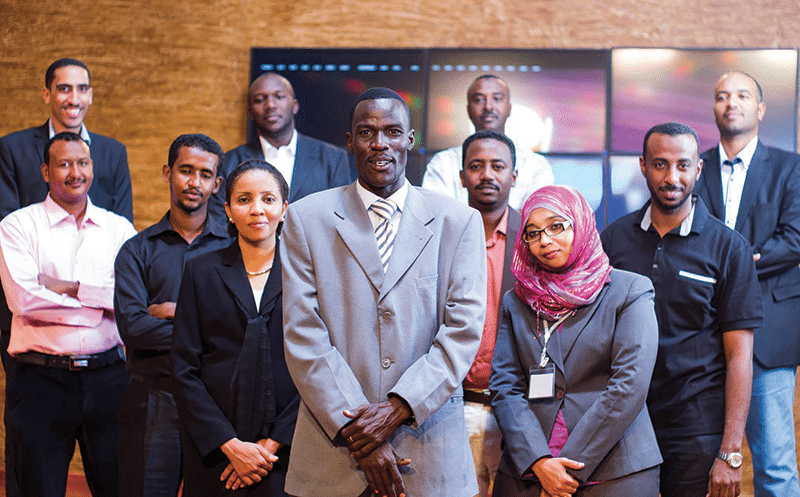
A group of the finalists of ‘Mashrouy’, Sudan’s answer to
‘The Apprentice’, with winner Samah Al Gadi, third from right
But the realities in Sudan have changed. In 2011, when South Sudan declared independence, it took with it three quarters of the country’s oil revenues, on which Sudan was highly dependent. Sudan’s economy has struggled ever since. The currency has been devalued, inflation has soared and jobs are scarce. Youth unemployment has hit 34 percent. Mounting dissatisfaction sparked a series of deadly protests which rocked Khartoum in the autumn of 2013, resulting in 50 deaths. Solutions are sorely needed.
It was hoped that ‘Mashrouy’ would be a first, small step on a long road to recast entrepreneurialism in a positive light and provide another way to respond to the country’s problems. The organisers were under no illusions that it would be straightforward, and the search for judges confirmed the project would be a hard sell. One after the other turned down the opportunity, unwilling to risk association with an unknown project which might fail, before judges bold enough to take the risk were found.
The organisers were also worried that there would be too few submissions and ideas worthy of support. They hoped to get 300 to 400 applications, out of which 20 good ideas could be culled. But, unexpectedly, the project touched a nerve with the country’s young people. An avalanche of 3,000 applications arrived in response to the widely publicised open competition, swamping the organisers. Suddenly, instead of having to dig for the few buried good ideas, the challenge became filtering down a surfeit of them.
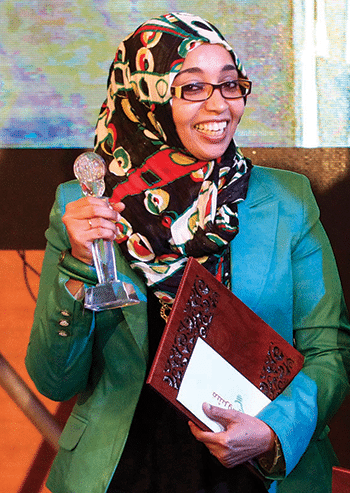
Samah Al Gadi. Photo: British Council
A third of the submissions were from people aged 25 or under and a quarter were from women, a remarkable showing in a conservative culture where the prevailing norm and aspiration remains marriage and children. In fact, according to Abdellatif, who also served on the panel of judges, the women proved particularly strong competitors with very serious drive. “They almost shamed the guys, who just weren’t as aggressive,” he says.
Back in the Corinthia hotel, the PA system kicks back into gear. The winner is announced. It is Samah Al Gadi, a bubbly, bespectacled office worker and entrepreneurial force of nature. Jubilant and beaming, she punches the air and flashes victory signs with both hands.
‘More than just a body’
Samah, 32, had only put her application in at the last possible moment, finally succumbing to her mother’s relentless insistence that she apply. Her project was designed to solve the serious problem of the water hyacinth that plagues Nile communities and turn it to benefit them. A weed whose rampant growth obstructs river transport, water hyacinth diminishes fish supplies and creates a breeding ground for malarial mosquitoes and the parasites which cause bilharzia. Eradication efforts to date have been unsuccessful and damaging to the environment. Samah decided to approach the problem from a different angle, proposing to harvest the weed and transform it into products such as bags, furniture and ropes, using a process which has been successfully exploited in Asia.
When Samah’s idea made it onto the shortlist of 12 projects, she found herself up against nine men and two other women, who were promoting projects including ostrich farming, recycling trash into furniture and rebranding and exporting a much-loved Sudanese spicy peanut butter. Mazen Mergani, 24, wanted to sell a machine he had invented which would mechanise the harvest of gum arabic, a product used in everything from chewing gum to shoe polish, and which is currently only harvested by hand. Babiker Hassan, meanwhile, aimed to increase the supply and quality of tilapia fish through a new system of aquaculture.
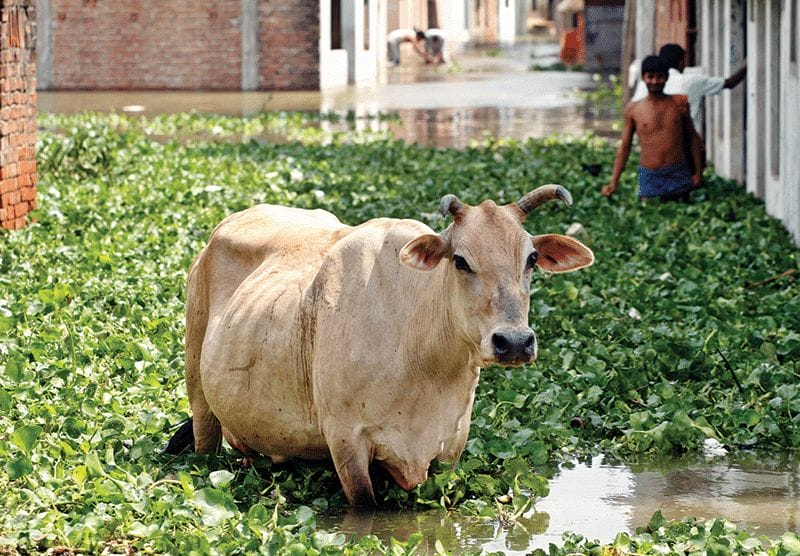
Samah’s project tackles the fast-growing water hyacinth, which causes problems in waterways across Africa and east Asia. Photo: Rajesh Kumar Singh/AP/Press Association Images
Unlike the anglophone versions of ‘The Apprentice’ with their frantic tasks, snide taskmasters and constant politicking, ‘Mashrouy’ was a much more serious affair. The contestants squared off against each other through a series of presentations and pitches, attempting to convince the panel of judges and the viewers of their project’s viability and their own capability to make it happen.
Samah jumped right in. She knew she had to speak to the voting public and turned to social media, launching a dedicated Facebook page and making a series of videos showing her plans to turn the water hyacinth into saleable products. She enlisted friends and family to spread the word using WhatsApp. “Suddenly, I found I had a lot of attention. It was exciting, I couldn’t sleep. I’d stay up until 5am doing it,” she says. “I was building a huge network, a huge campaign.”
The show began airing twice a week in November 2013. It didn’t take long to catch on, quickly surpassing the organiser’s expectations. Facebook groups were formed. People began to meet up to watch episodes together. The pitches were discussed at parties and on street corners. The audience grew and grew.
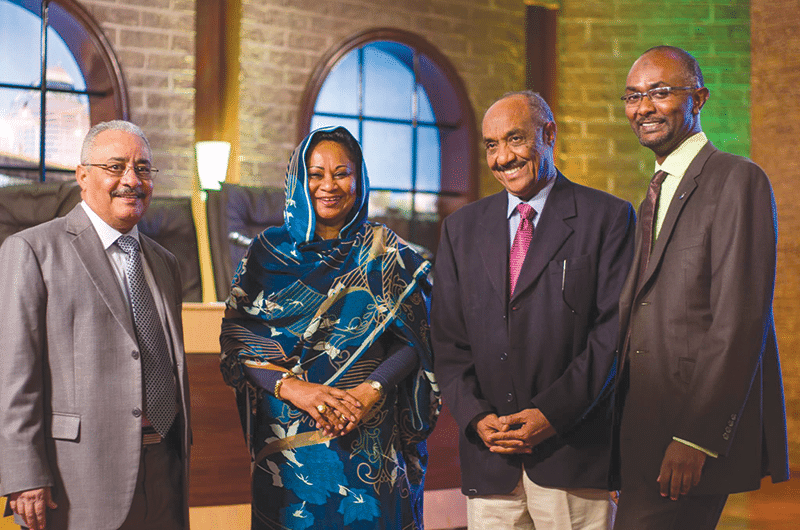
‘Mashrouy’’s panel of judges, from left: Kamal Ahmed al-Zubair, Abida Yahia Mahdi, Syed Ahmed Hassan and Ahmed Abdellatif
The ruthless ‘You’re fired’ streak of the anglophone Apprentice was absent, but the programme came with its own unique challenges, especially for the female contestants. The goal of attracting the attention of the audience, persuading them about the project and its creator’s personality demanded conformity to the rigid, complex and often subtle dictates of female behaviour in Sudanese culture. “It was hard,” says Samah. “I am a woman and I had to get them to accept me. But if you sit the wrong way or dress the wrong way they won’t accept you. In our culture, people believe the woman has to stay at home and when you reach a certain level of education, you have to stop. People say, ‘She’s 32, why isn’t she married, why doesn’t she have children?’ Women have to work hard to make others see them as more than just a body.”
For someone like Samah, conformity doesn’t come naturally. A driven, irrepressible ball of energy, with a great sense of humour, two advanced degrees and a passion for Michael Jackson and Nina Simone, she is not one to twist herself out of shape to fit in. “I like to be myself,” she acknowledges. “If people like it, okay. If they don’t, okay.” Her father was her inspiration. “Never ever feel dumb because you are a woman,” he repeatedly exhorted his four daughters. “First, you have to work hard for yourself, get knowledge and do something for the world and the community around you. Then, after, you can marry.” Samah took his words to heart.
Waste to wealth
Samah’s victory had an extraordinary and immediate impact in Sudan, especially on young women. “Most girls in Sudan only want to get married and have children,” she explains. “That’s the end of their life. They don’t want a career.” But after the show, Samah was deluged with emails from girls declaring that she had made them look differently at their own lives and inspired them to go further. “One said she had intended to stop her studies, but after the show, she thought, if Samah can do it, I can do it and changed her mind.”
Samah was delighted to get the emails from her new fans and saw it as a huge responsibility. She remains in contact with them all by email and phone, dispensing advice and keeping tabs on their progress. “I give my phone number and when they reach me, they say ‘I can’t believe I got you on the phone.’ I say ‘Why? I am just a girl like you, just lucky enough to be on TV – nothing else. There’s nothing magical. You just have to work hard’.”
Samah’s win also brought an immediate response from a number of Nile communities blighted by the problem of water hyacinth. Kosti, a village south of Khartoum on the White Nile, is the first spot where it begins before it spreads south down the river. Kosti is dependent on the river for survival and has been bedeviled by the weed, which has forced the closure of the port, diminished the fish supply to nearly nothing, rendered the population vulnerable to the ravages of malaria, and collapsed the economic fortunes of the population.
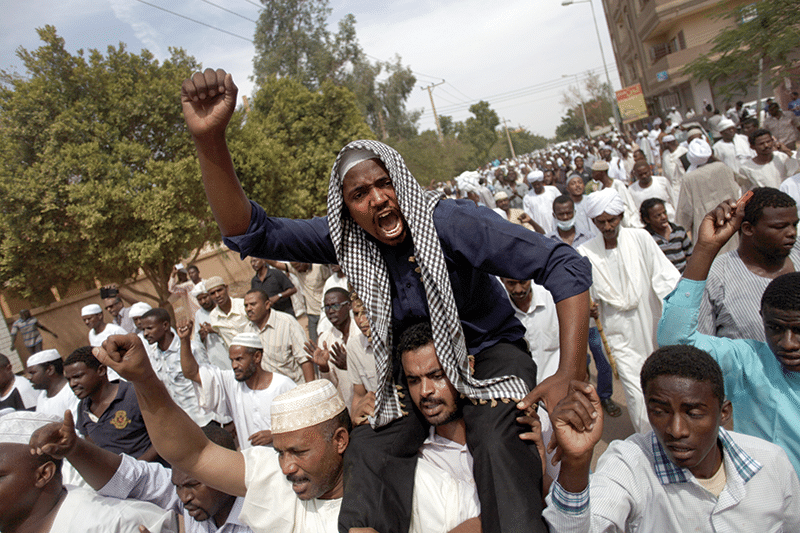
Dissatisfaction with Sudan’s struggling economy sparked a series of deadly protests across Khartoum in autumn 2013. Photo: Khalil Hamra/AP/Press Association Images
There was a deluge of emails, phone calls and visits to Samah’s office from people from Kosti, imploring her to work with their community. They are in luck. Kosti is where she intends to establish her “waste to wealth” pilot project. But it won’t happen quickly. Her first step will be six months of intensive training in Thailand to learn the full process she will put into practice in Sudan. She was also flown to London to meet UK entrepreneurs and receive business advice. She is relishing the flurry of activity. “I am not the kind of person to sit around and do nothing. I like to be busy,” she says.
Meanwhile in Sudan, Mashrouy’s other contestants have also been benefiting from the programme’s success. A businessman from the UAE flew in specifically to meet with two of the contestants, while others were interested in investing in the spicy peanut sauce.
A drove of wannabe entrepreneurs have come out of the woodwork in recent months too. Applications to appear on the second series of ‘Mashrouy’ have inundated the show’s organisers. An 80-year-old woman who had been making and selling knitwear in her community for years arrived at ‘Mashrouy’’s offices laden with samples of her work, saying she wanted to put herself forward as a contestant. “When I explained the show was for the youth, she said ‘You’re being ageist, you shouldn’t be ageist!’” says Abdellatif, laughing. He says he can see a real shift beginning in the country’s attitude towards entrepreneurialism. “‘Mashrouy’ has definitely changed things,” he says. “It is a better time for people thinking about starting a business and at least now you have a foot in the door. You know you won’t be ridiculed.”
Slow Journalism in your inbox, plus infographics, offers and more: sign up for the free DG newsletter. Sign me up
Thanks for signing up.

